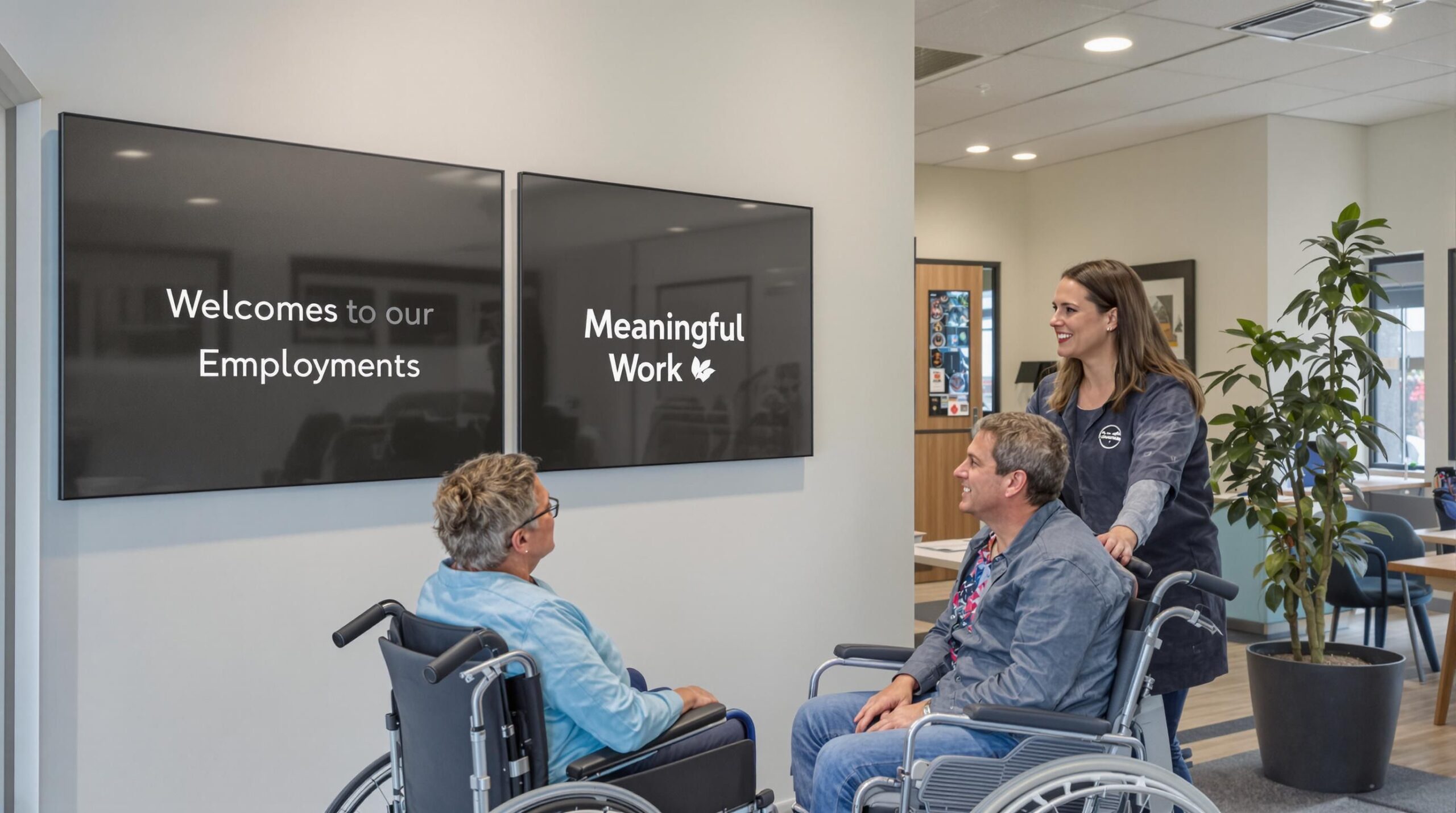Mental Health Support in Pakenham: Your Map to NDIS Journey and Lasting Well-being
June 11, 2025 | ndis mental health support | No Comments
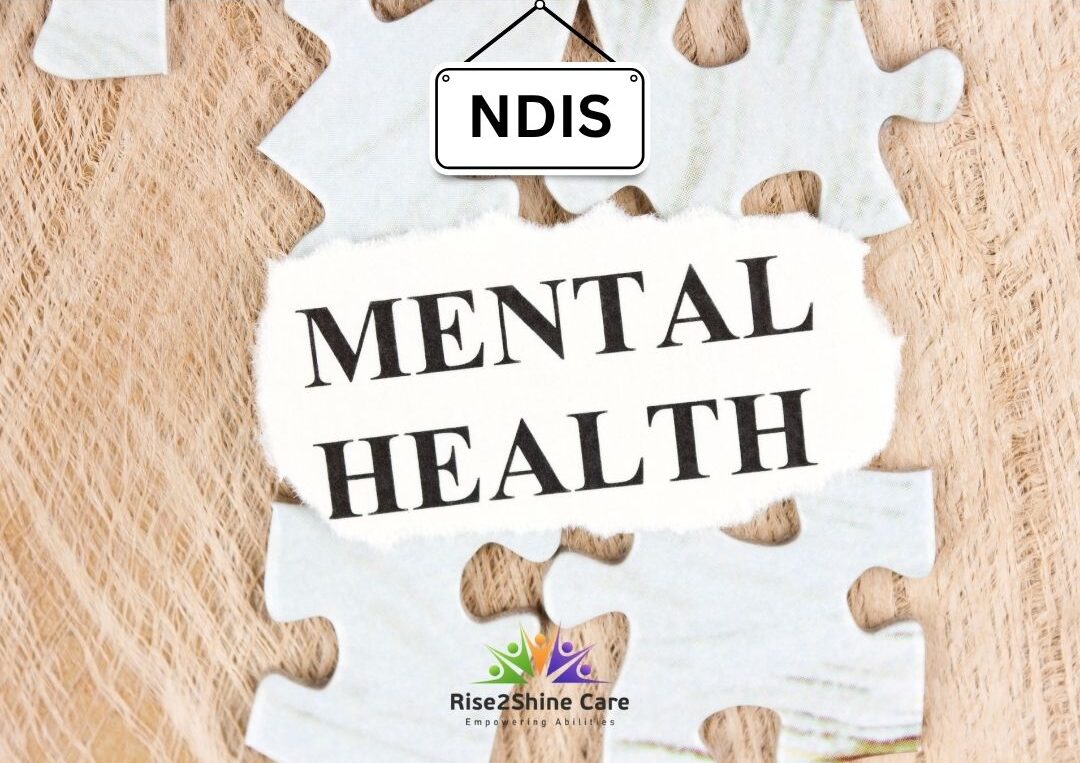
Whether you’re living with a mental health condition yourself or supporting someone who is, you probably understand just how deeply it can affect everyday life, from managing simple routines to staying connected with others or holding down work. In some cases, these challenges become long-term and start to impact independence and quality of life in a major way.
When that happens, it may be more than just a mental health concern- it might be what’s known as a psychosocial disability.
This kind of disability can make everyday life feel overwhelming, even unmanageable at times. And when that’s the case, people often need more than short-term treatment, they need ongoing support.
That’s where the National Disability Insurance Scheme (NDIS) comes in. It is designed to support Australians with significant and lasting disabilities including those caused by mental health conditions, the NDIS can fund a range of services to help people regain control, independence, and confidence in their daily lives.
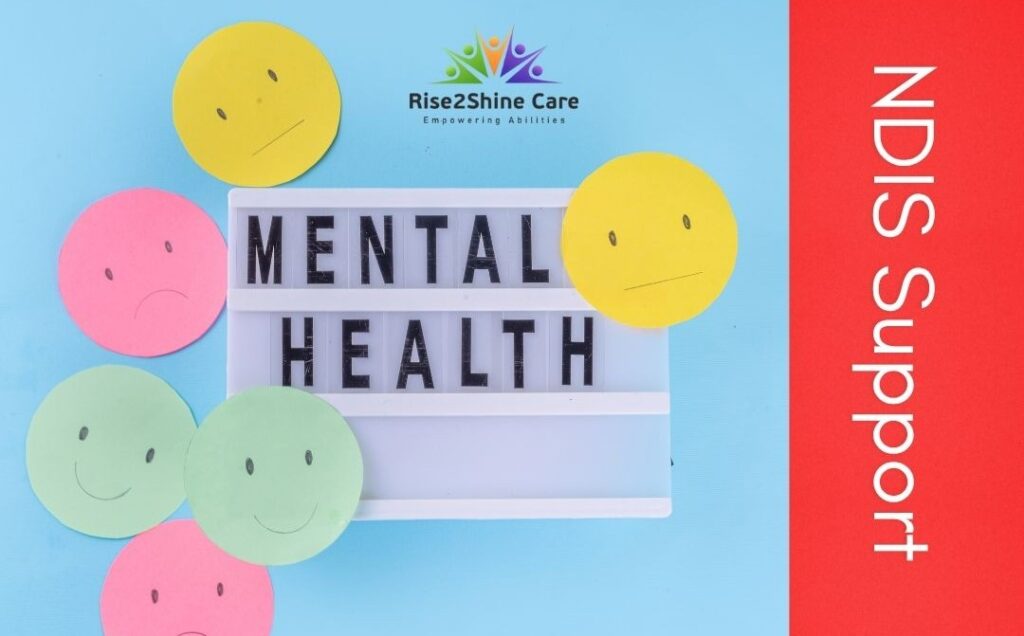
But understanding how it all works, especially here in Pakenham, can feel confusing. That’s why this guide exists.
Here’s what we’ll walk through together:
- What psychosocial disability really means and how it relates to mental health
- Who might qualify for the NDIS, and what the eligibility criteria look like
- How to apply, and what kind of evidence is needed
- Trusted local services in Pakenham that can help you through it
- The types of supports the NDIS may offer for mental health
Whether you’re just starting to explore support or feeling stuck somewhere in the process, this guide is here to help you take the next step clearly, calmly, and with the local insight you need.
What is NDIS Mental Health Support in Pakenham? Understanding Psychosocial Disability
Lots of people experience mental health challenges at some point, feeling anxious before a big event, going through a tough breakup, or feeling low for a few weeks. With the right support, many people can recover and get back on track.
But for some, a mental health condition doesn’t just come and go, it sticks aroundfor a long time and starts to makeeveryday life really hard to manage.
That’s what’s called a psychosocial disability.
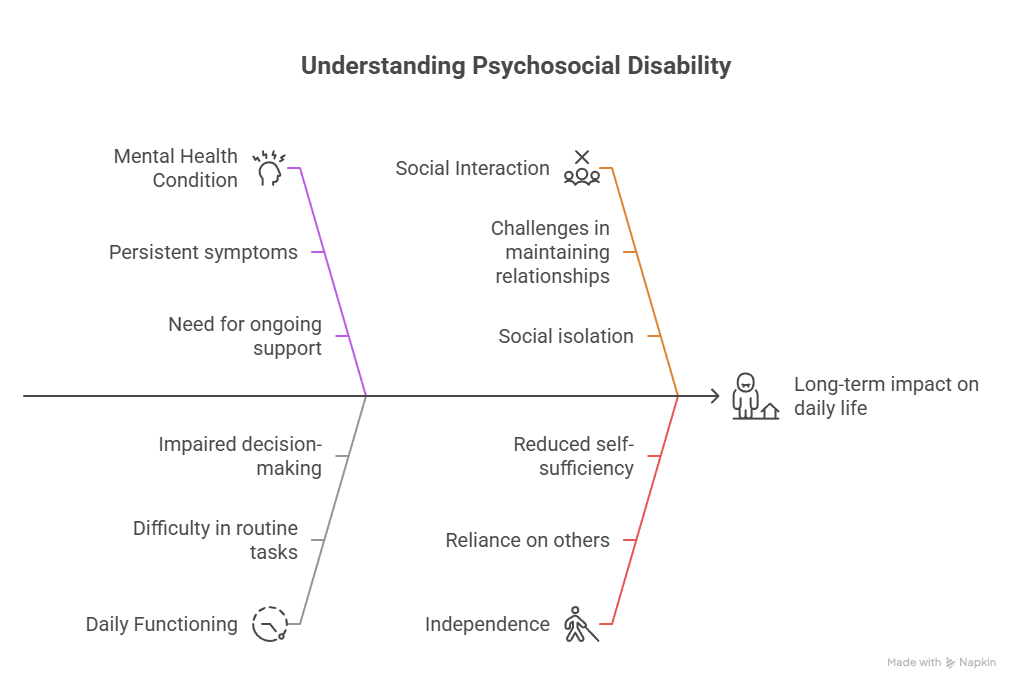
Here’s how it differs:
- A mental health condition might make someone feel sad, anxious, or stressed for a while. They might need therapy, medication, or time off and then feel better.
- A psychosocial disability means the condition is long-term, and it seriously affects a person’s ability to do everyday tasks such as getting dressed, going to the shops, making decisions, or keeping up with friends and family.
Overall, it is not just about the name of your condition.
It’s about how much it affects your daily functioning and your independence over time. If you or your loved one is facing such a condition, then you may be eligible for NDIS mental health support in Pakenham, so it’s worth exploring your options.
Conditions that can lead to psychosocial disability include:
- Schizophrenia
- Bipolar disorder
- Severe depression
- Anxiety disorders
- Post-traumatic stress disorder (PTSD)
Here is a chart to simplify the difference between psychosocial disability and general mental health.
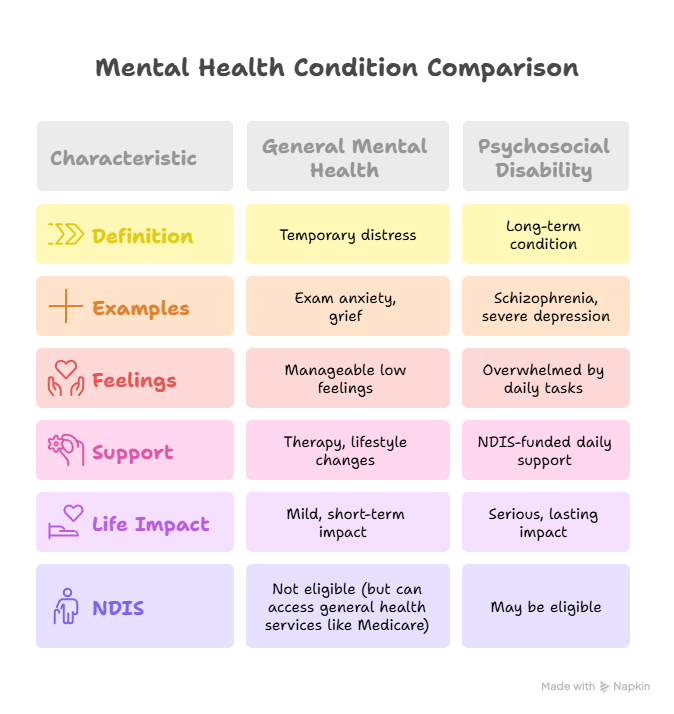
How Does the NDIS Support Psychosocial Disability?
The NDIS provides funding for supports that help individuals with psychosocial disabilities improve their functional capacity and participate more fully in their communities. The support is designed to be flexible and tailored to each individual’s needs and goals.
Some examples of NDIS-funded supports for psychosocial disability include:
1. Psychosocial Recovery Coaching:
- A team member to help each participant develop and build the skills to manage their lives and work towards their recovery goals.
2. Capacity Building Supports:
- This includes building skills and autonomy in areas like education, employment, or daily living tasks.
3. Social and Community Participation:
- Supports that help participants engage with their community, form new social connections, and participate in social activities.
4. Assistance with Daily Living:
- Assistance with daily tasks such as personal care, household chores, and meals so participants can live independently.
5. Support Coordination:
- Help navigating the NDIS and connecting with other supports and services.
Note: The NDIS mental health support in Pakenham are intended to help people with psychosocial disabilities manage the functional impacts of their condition. This does not replace clinical mental health treatment, which is the responsibility of the broader health system.
Are You Eligible? NDIS Mental Health Eligibility Criteria for Pakenham Residents
If you’re living with a mental health condition that makes daily life difficult, the NDIS might be able to support you. But first, you’ll need to meet a few key requirements.
Here’s a quick and simple breakdown:
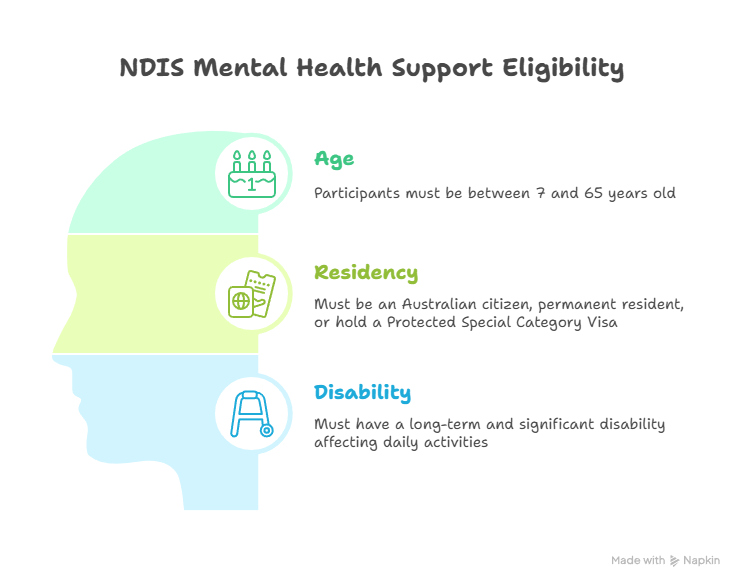
1.Age: You need to be between 7 and 65 years old.
- Under 7? You may qualify for early childhood support.
- Over 65? My Aged Care might be the right path for you.
2. Residency: You must live in Australia and be:
- An Australian citizen,
- Apartment resident, or
- Hold a Protected Special Category Visa.
3. Mental Health Condition is Long-Term: Your condition needs to be ongoing and not likely to improve with current treatments. This doesn’t mean you’re not trying; it just means more support is needed.
4. You Need Support with Daily Life: Your condition must make it hard to do everyday things, like:
- Taking care of yourself
- Moving around
- Communicating
- Learning
- Joining in work, school, or community activities
- Managing emotions or making decisions
Even one area is enough to qualify.
What Does “Significant Impact on Daily Life” Actually Mean?
How much is your condition affecting your ability to live independently?
The focus is on six main areas of life, things we all deal with every day and see how your mental health condition is getting in the way. This includes things like talking to others, taking care of yourself, learning new things, and managing time or money.
Let’s take a quick look at these six areas and how someone with a psychosocial disability might experience challenges:
| Life Area | Examples of Difficulty |
| Communication | Trouble asking for help, feeling misunderstood, or avoiding conversations altogether |
| Social Interaction | Withdrawing from people, losing friendships, feeling unsafe in groups |
| Learning | Forgetting things easily, not being able to focus or learn new tasks |
| Mobility | Feeling trapped at home due to anxiety or panic in public spaces |
| Self-Care | Struggling with hygiene, meals, or medication without reminders or help |
| Self-Management | Missing appointments, not paying bills, or being unable to plan your day |
To put it simply, if your mental health makes it hard to keep up with daily life and it’s been going on for a while, you might be living with a psychosocial disability. And that could mean you’re eligible for help through the NDIS.
How to Apply for NDIS Mental Health Support in Pakenham (Step-by-Step Guide)
So, you think you (or someone you care about) might be eligible for NDIS mental health support, and now you’re wondering, “How do I actually apply?”
Don’t worry, you’re not expected to have all the answers straight away. The application process can feel a bit overwhelming at first, especially when mental health is already hard to talk about. That’s why in this section I will walk you through it step-by-step, in a way that is easy for you to understand:
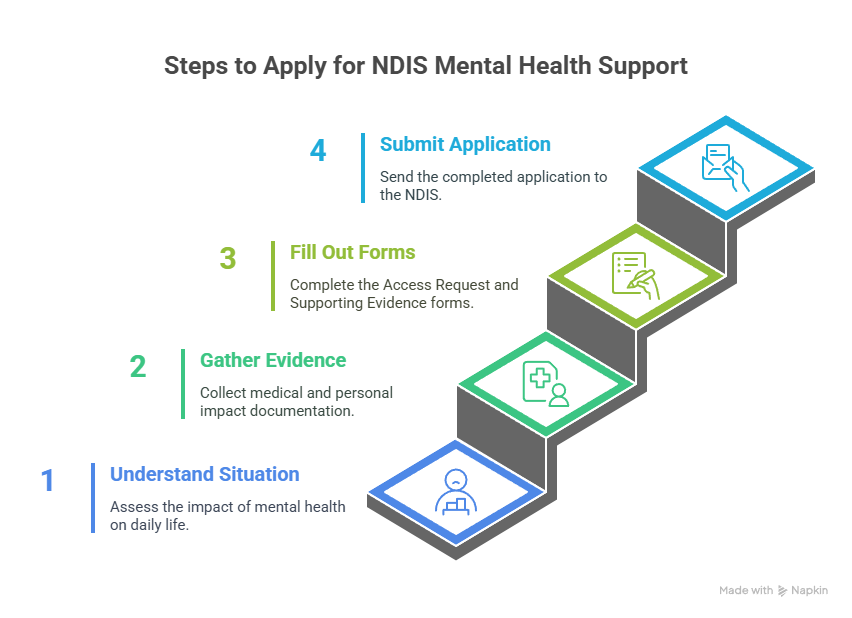
Step 1: Understand Your Situation
Before filling out any form, take a moment to check in with yourself (or loved one) and ask:
- Is this mental health condition long-term?
- Is it interfering with daily life – not only emotionally, but practically as well?
- Would some extra support make a difference in your independence, confidence, or routine?
If the answer is yes, you’re in the right place.
Step 2: Get Your Evidence Ready
This is one of the most important parts of your NDIS application, because the NDIS does not only need to know your diagnosis, they want to understand what your disability is doing to your life.
This is where strong evidence is important.
What Kind of Evidence Is Needed?
Support is usually granted based on professional documentation. This often includes:
- A detailed clinical history and diagnosis – usually written by a psychiatrist, psychologist, or GP.
- Your treatment history – It means past and present, including medications, therapies, and care plans. (if any)
- Evidence of how your condition affects your daily life – reports that describe your ability to function in everyday tasks. Standardized assessments like the WHODAS 2.0 or the Life SkillsProfile, may be used.
- Letters from your healthcare providers – these explain your situation from a professional perspective and can add weight to your application.
- Statements from people who know you well – friends, family members, or support workers can describe how your condition affects your day-to-day life.
Who Can Help You Collect This:
- Your local GP or mental health team
- NDIS access support services
- Local Area Coordinators (LACs) in Pakenham, they are trained to walk you through this process
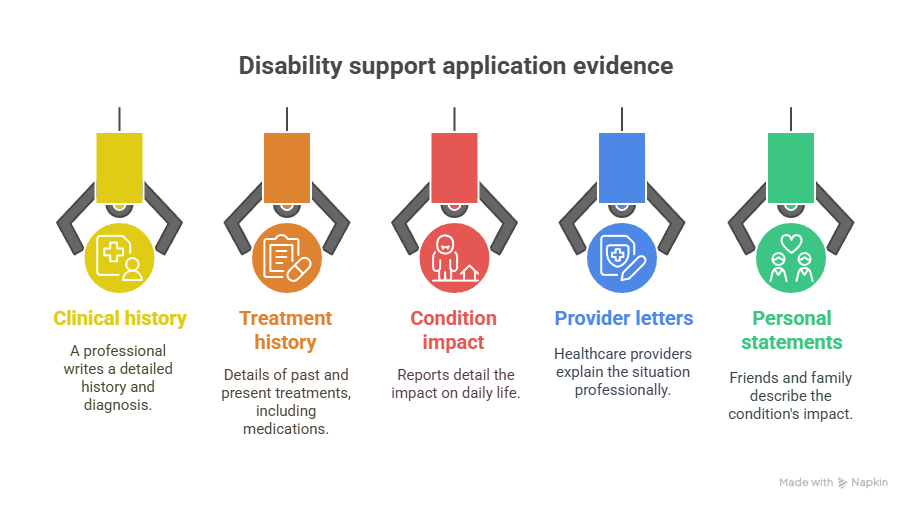
Step 3: Fill Out the Forms
There are two main forms you’ll need:
- Access Request Form (ARF) – This is your official request to join the NDIS
- Supporting Evidence Form (SEF) – This is where your doctor or psychologist will provide details about your condition and how it affects your daily living (e.g. showering, preparing food, getting out of the house).
Pro tip: When completing these forms, remember to focus on how your condition impacts your everyday living rather than just the name of your condition.
Always be honest, even if it makes you uncomfortable. Generally, the more accurate the depiction, the better chance you have of getting the support you need.
Step 4: Submit Your Application
You can send your completed forms and supporting documents to the NDIS by:
- Post
- Online upload
- Or drop them off at a local NDIA office
Once submitted, it can take a few weeks for the NDIS to get back to you, sometimes longer. While you wait, try to gather any extra documents that might strengthen your case in case they’re needed later.
However, the process doesn’t end by application submission only, here is what you should prepare if your submission is confirmed.
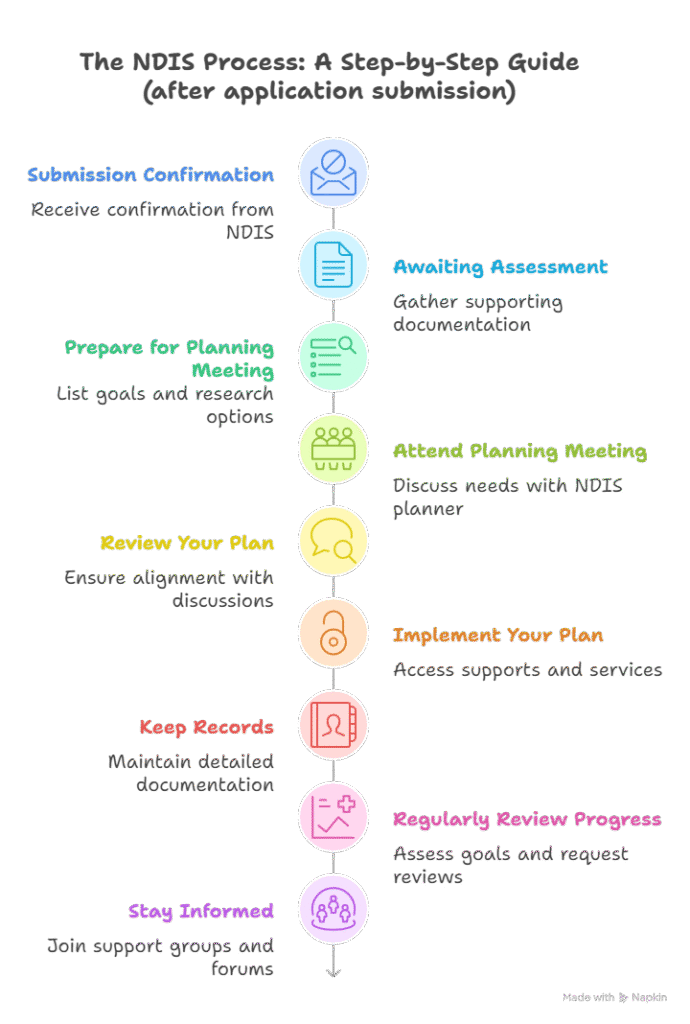
Local Support for Your Application Journey in Pakenham
1. Local Area Coordinator (LAC) – Latrobe Community Health Service
- Address: 48 John Street, Pakenham VIC 3810
- Phone: 1800 242 696
- Email: southern.melbourneLAC@ndis.gov.au
How they can help:
A Local Area Coordinator is your first point of contact for anything relating to the NDIS. They can help you navigate the application process, help you fill out the paperwork, and once approved, they can support you in connecting with the right services and supports in your area.
2. NDIS Access Support Providers
Organizations like Neami National, EACH, ACSO, and others understand how tough this process can be. They can help:
- Talk with you about whether you might be eligible
- Help collect the documents and reports you need
- Support you emotionally, because your wellbeing matters, too
3. NDIS Service Providers in Pakenham
Look for local NDIS service providers and review everything carefully, before committing to one provider.
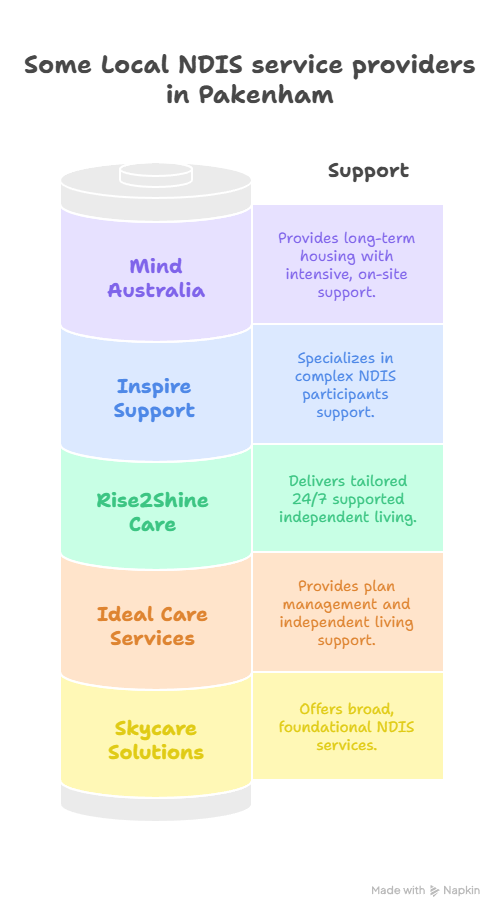
Common Application Challenges & How to Overcome Them
Let’s be real: applying for the NDIS with a psychosocial disability is not an easy task. Some people run into issues, but here few tips to overcome it and have a smooth journey to your NDIS plan.
| Challenge | How to Handle It |
| Not enough evidence | Ask your GP or psychologist to write a more detailed report -especially about how your condition affects daily life |
| Application denied | You have the right to request a review and submit extra documents |
| Feeling overwhelmed or retraumatized | Reach out to someone you trust, a support worker, or a local mental health service – your well-being matters during this process |
Beyond Application: What NDIS Mental Health Supports Can You Access in Pakenham?
The NDIS funds services that improve your ability to live independently and participate in society. These can include:
- Counselling and Therapy Sessions
- Support for Daily Activities
- Social and Community Participation
- Supported Independent Living (SIL)
- Assistive Technology and more.
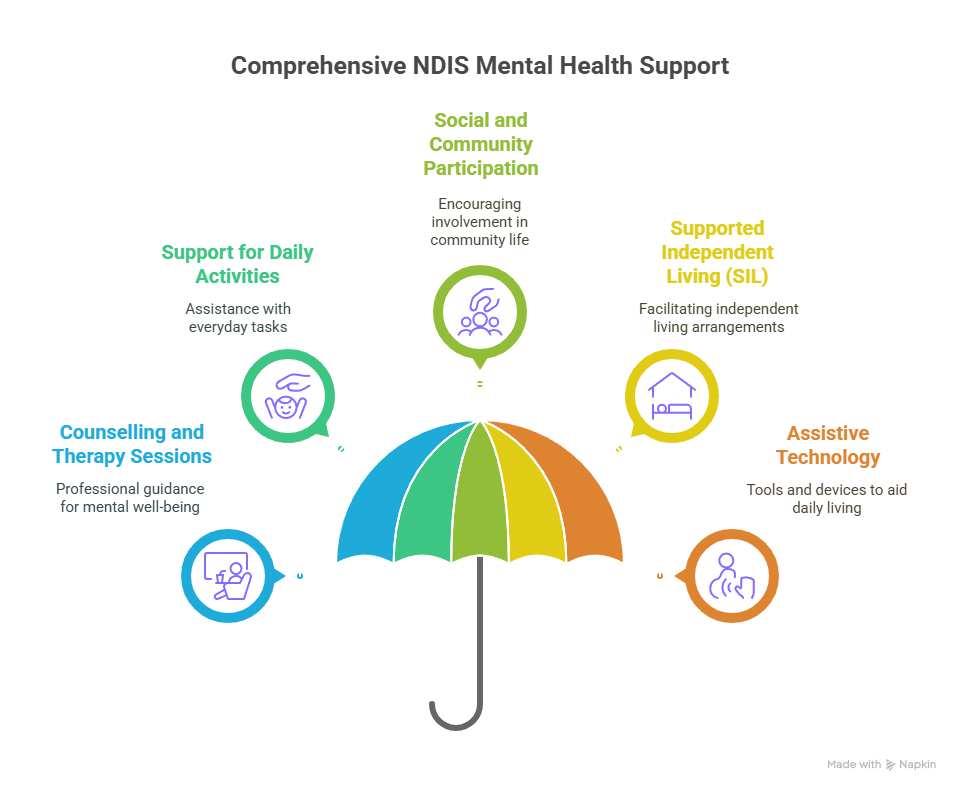
Some Community Support Groups in Pakenham
- Pakenham Support Group- GROW Mental Wellbeing Program: The community offers free, confidential peer-led support for depression, anxiety, panic at grief, and diagnose mental illnesses.
- Living and Learning Pakenham
- Anglicare Victoria etc.
Conclusion
Navigating NDIS mental health support in Pakenham isn’t always easy, but it doesn’t have to be difficult too. Understanding your options, knowing your rights, and connecting with the right support can truly change the way you live and feel each day.
Remember, you don’t have to do it all on your own. With the NDIS and a caring network of local services and professionals, there’s real support out there, tailored to your journey, your goals, and your wellbeing.
Frequently Asked Questions (FAQs)- NDIS & Mental Health Support
Q1: Does the NDIS pay for medication or medical treatment?
A: No, the NDIS doesn’t cover things like medication, that is handled by regular health services.
Q2: Can I get funding for psychology sessions?
A: Maybe. If it’s related to a long-term mental health condition and helps you build your everyday skills or independence, it might be covered.
Q3: My mental health goes up and down, can I still qualify?
A: Yes, many people have conditions that come and go. Here, you should remember the important thing is how it affects your everyday living and not whether it is a continuous condition.
Q4: Can my family get support through my NDIS plan?
A: The NDIS focuses on the individual participant, however, they acknowledges the important role families play. Occasionally, supports like respite care for carers or capacity building or training for families is included.
Q5: Am I required to share personal trauma to obtain NDIS support?
A: No. You can choose to not go into the details of your trauma. The NDIA just needs some basic information to understand your support needs, they respect your right to privacy.
NDIS disability services, ndis mental health, ndis mental health support pakenham

